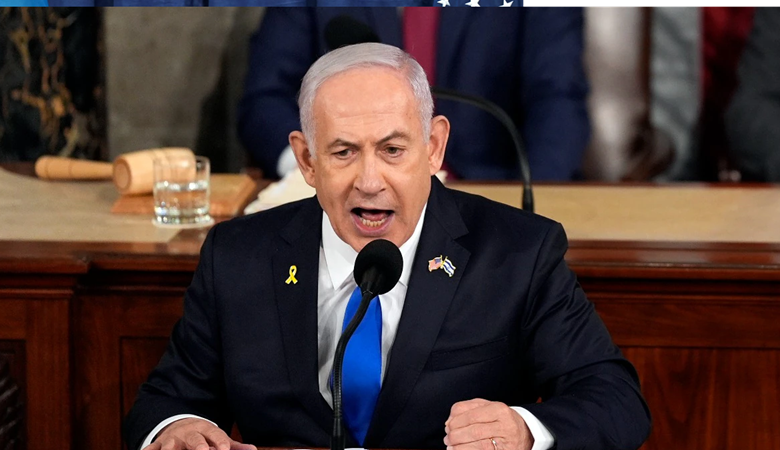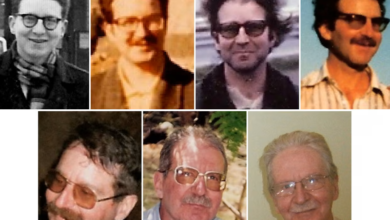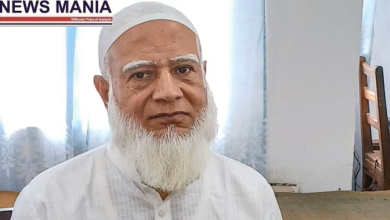Netanyahu’s Combative Speech in Congress Highlights U.S.-Israel Tensions Amid Gaza Conflict

News Mania Desk/Agnibeena Ghosh/25th July 2024
Israeli Prime Minister Benjamin Netanyahu’s address to Congress on Wednesday marked a defiant moment in the ongoing Gaza conflict, as he vowed “total victory” over Hamas and lashed out at American critics of the war. His speech underscored the deepening divisions in U.S. society over the conflict and exposed the strain between the Biden administration’s diplomatic efforts and Israel’s military stance.
Netanyahu’s remarks, delivered to a joint session of Congress, highlighted the strong historical ties between the United States and Israel. However, his speech also sharply contrasted with the more cautious diplomatic approach favored by the Biden administration. During his nearly hour-long address, Netanyahu received enthusiastic applause from many U.S. lawmakers, but faced notable silence from leading Democrats. The Prime Minister’s speech came at a time when significant segments of American society, including thousands of protesters and dozens of lawmakers, have voiced strong opposition to the war and the humanitarian crisis it has precipitated.
The protests surrounding Netanyahu’s visit became chaotic, with demonstrators clashing with police and vandalizing property near the Capitol. At Union Station, a short distance from the Capitol, protesters spray-painted statues and replaced American flags with Palestinian ones, reflecting the intense emotions stirred by the conflict.
In his speech, Netanyahu expressed the belief that the U.S. and Israel share a common interest in defeating Hamas and other Iran-backed groups. He wore a yellow pin to symbolize solidarity with Israeli hostages held by Hamas and emphasized that the U.S. and Israel’s mutual support was key to their success. His rhetoric included strong language, as he derogatorily referred to protesters against the war as “useful idiots” and criticized them for supporting the militants who have perpetrated violence against Israelis.
Despite his combative tone, Netanyahu did not address the ongoing U.S.-led mediation efforts for a ceasefire or the release of hostages. His comments reinforced his commitment to continuing the fight until Hamas’s military capabilities are eradicated and all hostages are returned. Netanyahu’s remarks were notably devoid of any direct acknowledgment of the peace negotiations and the potential for a diplomatic resolution.
The reaction to Netanyahu’s speech varied widely. While some Republicans praised his resolute stance, viewing it as a necessary defense of U.S. and Israeli interests, Democrats were less impressed. Critics, including Representative Jamie Raskin, felt that the speech failed to address the pressing need for a ceasefire and meaningful progress toward peace. Families of American hostages expressed disappointment, feeling that Netanyahu’s address did not commit to advancing the hostage deal currently being discussed.
The speech also highlighted political tensions within the U.S., with several high-profile Democrats and independents boycotting the event. Notable absences included Vice President Kamala Harris, who was engaged in a prior commitment, and Senator Patty Murray, who was replaced by Senator Ben Cardin as the Senate pro tempore.
Netanyahu’s visit, which included a meeting with President Joe Biden and a planned engagement with former President Donald Trump, underscores the complex interplay of domestic politics and international diplomacy. Netanyahu’s position is further complicated by the international scrutiny Israel faces, including arrest warrants from the International Criminal Court over alleged war crimes, which the U.S. does not recognize.
The visit, marked by its combative rhetoric and polarized reactions, reflects the broader challenges in U.S.-Israel relations and the ongoing debate over the Gaza conflict, revealing the deep divisions and political pressures that shape this enduring geopolitical issue.






